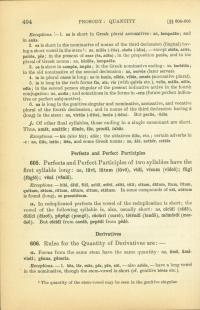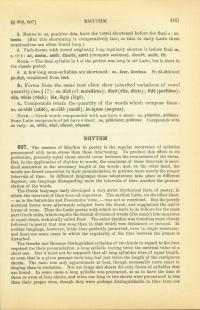606. Rules for the Quantity of Derivatives are:
a. Forms from the same stem have the same quantity.
ămō, ămāvistī
gĕnus, gĕneris
Exceptions—
1. bōs, lār, mās, pār, pēs, sāl—also arbōs—have a long vowel in the Nominative, though the stem vowel is short (cf. Genitive bŏvis, etc.).
2. Nouns in -or, Genitive -ōris, have the vowel shortened before the final -r.(But this shortening is comparatively late, so that in early Latin these Nominatives are often found long.)
honŏr
3. Verb forms with vowel originally long regularly shorten it before final -m, -r, or -t.
amĕm, amĕr, amĕt (compare amēmus)
dīcerĕr, dīcerĕt
audĭt
fĭt
Note— The final syllable in t of the Perfect was long in old Latin, but is short in the classic period.
4. A few long stem-syllables are shortened.
ācer, ăcerbus
So dē-iĕrō and pē-iĕrō, weakened from iūrō.
b. Forms from the same root often show inherited variations of vowel quantity (see § 17).
dīcō (cf. maledĭcus)
dūcō (dŭx, dŭcis)
fīdō (perfĭdus)
vōx, vōcis (vŏcō)
lēx, lēgis (lĕgō)
c. Compounds retain the quantity of the words which compose them.
oc-cĭdō (cădō)
oc-cīdō (caedō)
in-īquus (aequus)
Note— Greek words compounded with πρό have o short.
prŏphēta, prŏlŏgus
Some Latin compounds of prō have o short.
prŏficīscor, prŏfiteor
Compounds with ne vary.
nĕfās
nĕgō
nĕqueō
nēquam


